Cryptocurrency investing 101
Have you thought about increasing your portfolio diversification by including cryptocurrencies?
Whether it’s through funds like Grayscale, or through direct investing, there are many ways to get exposure to this asset and you just need to find the approach that works best for you.
Following their recent adoption by some large institutions such as Fidelity and Morgan Stanley, cryptocurrencies have been traded in much more digestible environments for the typical saver due to the traditional approach these institutions take. This is part of the reason why we have seen since the latter half of 2020 that some of them have achieved incredible returns.
To date, there are over 4,000 cryptocurrencies in the world. Among these, Bitcoin and Ether are recognized as market standards. Although these are two currencies whose operations are recorded and encrypted on a decentralized network called “blockchain” and validated using a process called “mining”, their characteristics differ in terms of their usefulness in the market of cryptocurrency. The ultimate goal of bitcoin is to incentivize the public to mine transactions that take place on its network to increase its power and drive adoption. Ether is a cryptocurrency that is used to promote adoption of its Ethereum network for the purpose of developing decentralized applications (“dapps”) that have various uses and benefits other than the storage of monetary values.
If this new asset class is of interest to you, you must still consider its extreme volatility. This could have a great influence on the return of your portfolio if your level of exposure is too high.
To help you in your efforts, here are different ways to transact and hold cryptocurrency:
Cryptocurrency exchanges
These platforms were rather designed to trade cryptocurrencies, but some people use them to host them as well. Although this option is more effective for buying and selling quickly, it is strongly recommended not to keep your cryptocurrencies in exchanges, since the connection to your private funds is done online (you will therefore not be safe from cyber attacks). Some examples of well-recognized cryptocurrency exchanges are Coinbase (https://www.coinbase.com/) and Binance (https://www.binance.com/en).
Wallets
First, you have to distinguish between a “hot wallet” and a “cold wallet”. Hot wallets have similar characteristics to cryptocurrency exchanges except that they sometimes lack a trading tool and their level of security can sometimes be increased, depending on the provider. Some examples of “hot wallets” are Exodus (https://www.exodus.com/) and Electrum (https://electrum.org/#home). The “cold wallet” is the safest and most recommended option for directly holding cryptocurrencies because they are hosted offline, so the risk of theft is almost zero. As opposed to the “hot wallet”, this one comes in the form of a USB drive which must be plugged into your computer in order to be able to transfer and receive cryptocurrency. The only downside is that you will have to keep your “cold wallet” somewhere where you know you can find it. Some people with huge cryptocurrency positions equip themselves with a fireproof safe to store their USB drive to protect against the risk of losing their data. Generally speaking, if you are the type of investor who does not actively trade cryptocurrencies, you will prefer the “cold wallet” option. Ledger (https://www.ledger.com/) and Trezor (https://trezor.io/) are two examples of this type of technology that is in common use.
Direct brokerage account
This is the approach advocated by investors who do not want to directly own cryptocurrency and who wish to have their funds guaranteed by institutions. It is in these types of accounts that investors can buy and sell exchange traded funds that track the price of Bitcoin and other predominant cryptocurrencies. In Canada, CI Global Asset (BTCX, https://ci.com/en/investment-solutions/bitcoin), Purpose (BTCC, https://www.purposeinvest.com/funds/purpose-bitcoin-etf) and 3iQ (QBTC, https://3iq.ca/the-bitcoin-fund-qbtcu-qbtc/) are providers of exchange traded funds exposed to Bitcoin.
Please note that we are not cryptocurrency experts, but are interested in learning more and have made the decision to share our research with our readers. Looking forward to chat with you!
